By Graham Fuller in the November-December 2011 Issue
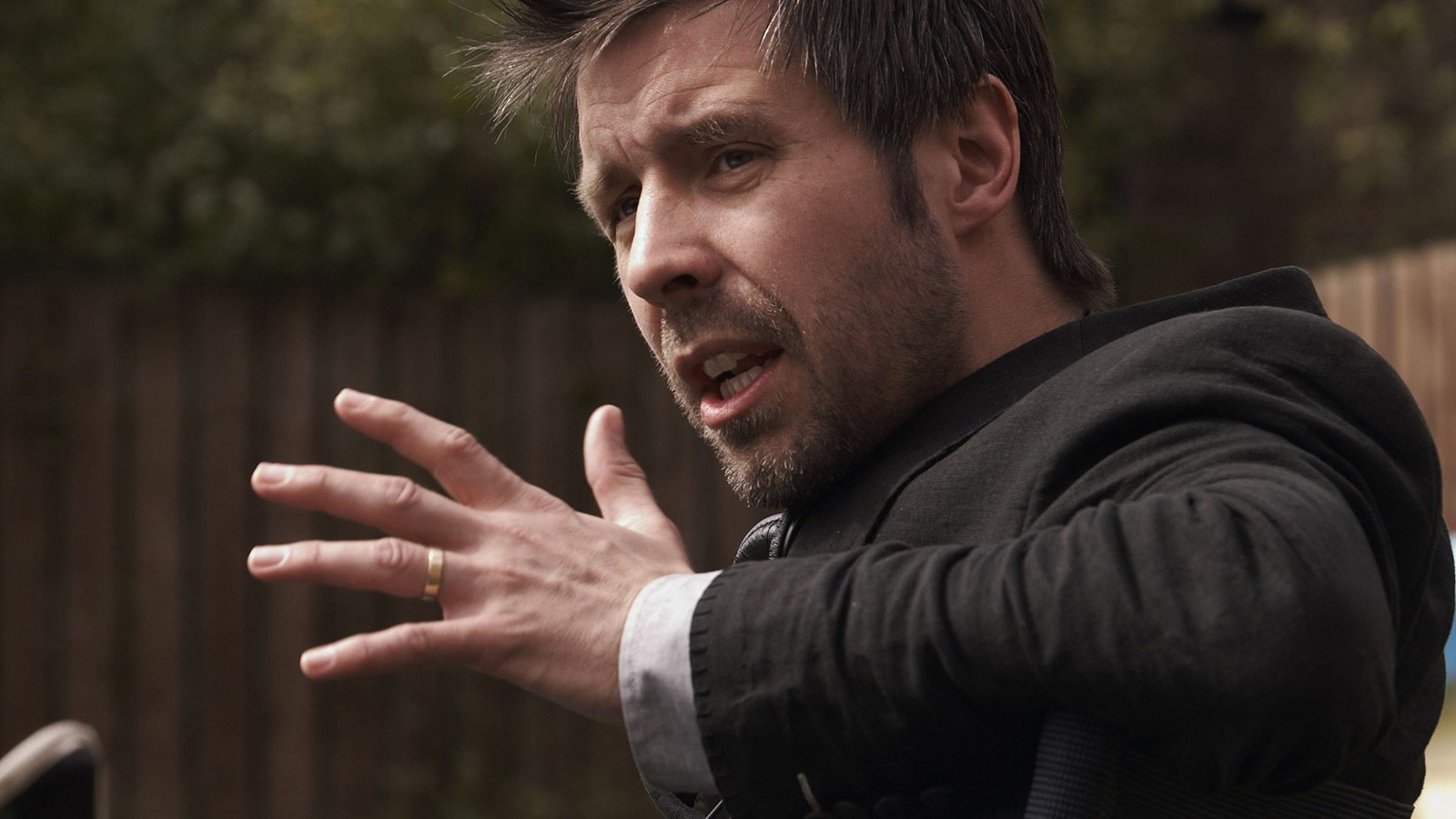
Online Exclusive: An Interview with Paddy Considine
A candid talk with the acclaimed actor-turned-director. Tyrannosaur, his debut behind the camera, opens Friday in select cities.
As an actor, Paddy Considine, 37, has blessed a range of downbeat British films with his lugubrious, sometimes volatile presence, among them his friend Shane Meadows’s A Room for Romeo Brass (99) and Dead Man’s Shoes (04), Pavel Pawlikowski’s Last Resort (00) and My Summer of Love (04), Michael Winterbottom's 24 Hour Party People (02), Stoned (05), and Red Riding: 1980 (09). He has also made the odd foray into Hollywood for Cinderella Man (05) and The Bourne Ultimatum (07).
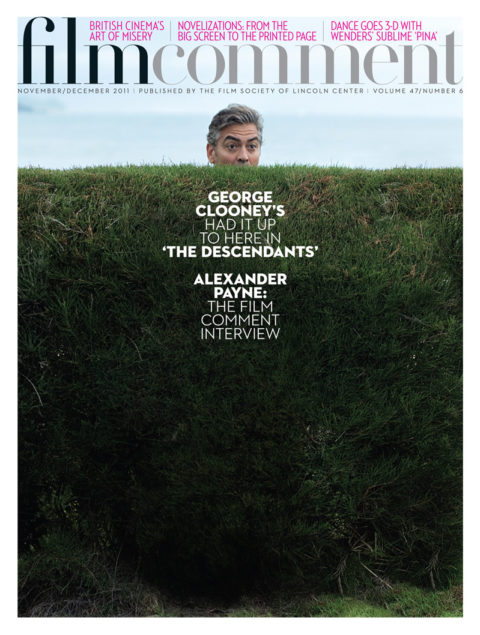
From the November-December 2011 Issue
Also in this issue
As a writer-director, Considine cranks up the volatility with his outstanding feature debut, Tyrannosaur, which he took a dry run at with his 2007 short, Dog Altogether. Peter Mullan, who also starred in the short, plays an enraged widower, Joseph, who, at the outset, kicks his dog to death. Lurching into a Christian charity shop managed by a devout middle-class woman, Hannah (Olivia Colman), he initially curses her for slumming in his impoverished neighborhood in the Northern city where they live. But when he realizes she’s being terrorized by her husband (Eddie Marsan), he befriends her; it’s a redemption quest with a shocking twist. Considine talked to me about Tyrannosaur when he brought it to New York for New Directors/New Films in the spring.
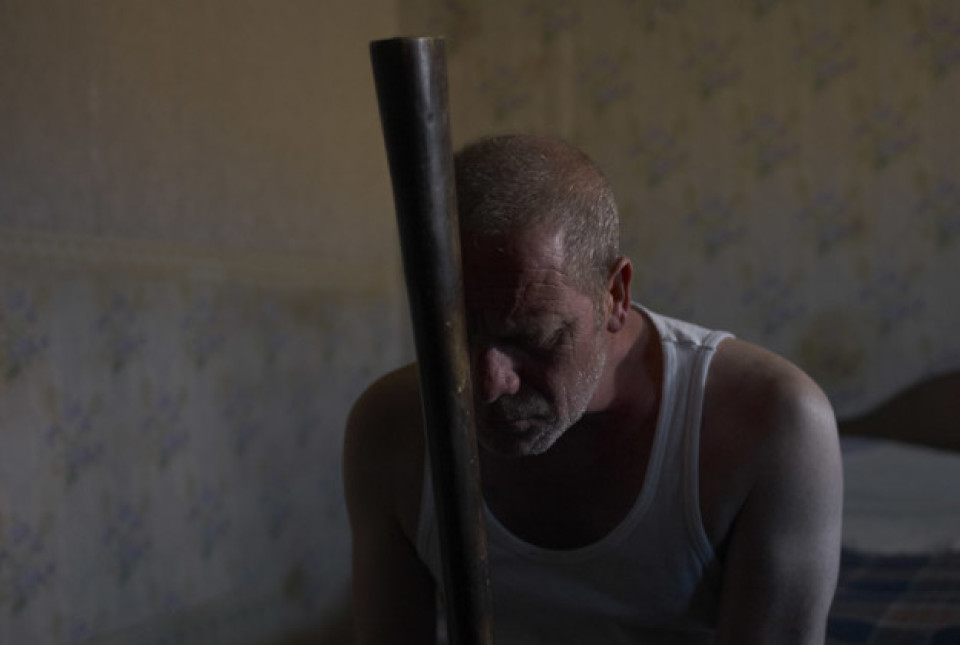
To what extent was Joseph inspired by your father?
My dad was somebody who’d display his anger publicly and not behind closed doors. A lot of the things that Joseph does, like demolishing the shed—my dad would act that way. He would have these eruptions. He wasn’t the kind of guy who would take his belt off and thrash us, but if he had an altercation in the post office with the guy giving him his social [security check], he’d put a wheelie bin [waste container] through the window. I guess it came from suppression and not understanding how or why anger manifests itself. If he was in a pub and talking to someone who couldn’t articulate himself, he would hit him. He was quite a reactive guy, and I think he struggled with relationships and with interactions. It’s because he grew up in a family in Ireland with a stepfather who abused him. My dad was a very bright, articulate man, who dumbed himself down in order to survive. So there was this intelligent man inside this body who had no way of expressing himself. That’s the similarity with Joseph.
Was the desire to explore those emotions that prompted you to create Joseph?
It’s a character, inevitably, at the end of the day. My dad would never have kicked his dog. If anybody had kicked his dog, it would have been game over. He was more protective of his dog than he was of his children. But when you write, you romanticize things a little bit.
Clearly, though, you had a need to examine anger.
Because I’m just the same—I’ve struggled with anger for years. Sometimes if someone sits near me or stands near me, I feel the urge to hit them, to take that immediate “route one” [a direct form of attack in soccer], as if someone has done an injustice to you and you immediately want to equalize, but because of my circumstances I don’t do it. It’s a feeling that’s beyond thuggish; it’s not a pleasurable enjoyment or a celebration. It’s something that’s destructive to your soul.
Is that same kind of anger inside your character Morell in A Room for Romeo Brass?
He definitely had the same thing. He was like a young kid spiraling out of control. He had no gauge on his emotions. If he thought he’d fallen in love, he’d fallen in love. Joseph is more shut off. He has tried to close himself down.
He’s not only grieving for his wife, but he’s guilt-ridden for the way he treated her.
He’s brutally honest about it. I don’t think he misses her. His guilt is far more selfish than that. But he admits he got it wrong—she was beautiful and she wasn’t stupid, as he’d once thought.
She’s the ghost in the story. His reminiscence about calling her “Tyrannosaur” because she was heavy casts a shadow over the entire film.
There’s a presence in that house and it’s her. She’s not there physically, but she’s there in the headless ornaments, the photographs, and the sounds of the house. She looms over it.
Was she an invention?
My mother had diabetes, too. She lost her sight, she lost her legs. And the film is dedicated to her. But this is where it gets a little mad for me, because it’s not an autobiographical film at all. It’s a piece of fiction, and in some respects a piece of Gothic fiction. It’s heightened—I didn’t make a social realist film in any way whatsoever. Joseph’s articulations aren’t my father’s. I think they’re more mine, though in a way they’re both of ours. My mum did have this incredible capacity for forgiveness and I thought it was a weakness. I thought it helped in her destruction, physically. I realize now that she was probably more godlike than anybody I’ve ever known. When you write a film, what’s it ultimately about? It’s an expression of yourself, but just an expression. It’s not your life.
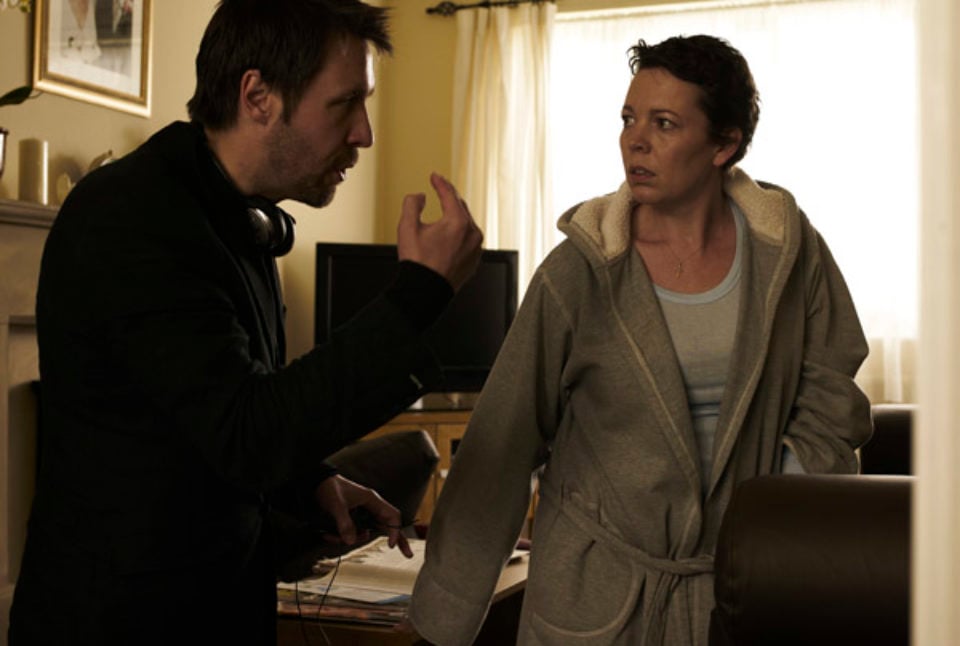
Hannah’s Christian faith does little to help her in her abusive marriage. Were you expressing your feelings about religion through her?
First, when you write something, you don’t want to give anybody the impression that you contrived it, that there was some sort of manifesto. You don’t want to go, “I’m really going to challenge our perceptions of the middle class in this country.” It wasn’t that. I wrote this scene where Joseph made these assumptions about Hannah. He stripped her down and somehow got to the core of her. He hit the nail on the head, like a clairvoyant, which is why she cries. He goes, “What are you doing down here? Have you got a family? Have you got kids? Why are you in my estate?” Her character just evolved from there.
I hate organized religion. But I believe in God, I have to believe in human beings, and I have to believe that we have the capacity to overcome. Having lost both parents young, I felt, “This thing’s pretty pointless, innit?” You spend your life trying to survive an obstacle course, and in your dark moments you think to yourself, “I don’t think I’m cut out for this course. I’m off!” But there has to be a purpose. Hannah so purely believes. Her love is the thing that’s so strong in the whole film.
The irony is that she harbors a rage and desperation that, when it comes out, exceeds what even Joseph does.
She goes further than he ever has in his life.
And he’s appalled.
I did a Q&A session where this guy said, “How come Joseph suddenly becomes all moral?” And I went bananas—I unleashed on him. It’s like, “Are you a film critic or a human being? Have you ever changed your mind? Have you ever felt compassion? Have you ever hated and then loved?” It’s beyond all those things. This woman has committed the ultimate act, and I think it’s overwhelming for Joseph to comprehend that. It’s not like he becomes moral. He says, “You’ve got to turn yourself in, darlin’.” There’s no contact whatsoever. She just comes to the agreement that she’s going to do the right thing and face the truth.
She asks him to hold her, but he doesn’t, which is very painful.
It’s the only way you can build anticipation for what follows. I had it in the script that he went over to her and held her, but when we stood there on the day, I just turned to the actors and said, “I don’t think he can go anywhere near her.” Of course, you want him to hold her. I want to hold her. But if he engages with her, then you haven’t got an end scene. You have to earn it.
Did you leave yourself open to chance a lot?
This film wasn’t improvised—it was written. But you do leave yourself open to things happening, because it’s a process and it’s always writing itself. Even in the edit, it’s writing itself all the time. Being on location where you bring the community into your film is part of this. It happened with the guy with the guitar in the pub. He was a busker on the street who started following the crew when we were in town shooting, and I said, “If you want to be in the film, come here and make up a song for me,” and he did on the spot. So I had him in the wake scene [following the cancer death of a friend of Joseph]. It was very organic.
I was talking to Paul Popplewell about a scene where [as the brutish owner of a ferocious dog that provokes Joseph to commit an act of violence] he steps outside. I said, “I can’t find a way to make it other than just a guy coming out with his dog. I want to make it a little funnier than it feels.” Just then I saw out the corner of my eye this guy who’s got a Staffordshire bull terrier strapped round his waist. I said to Paul, “That’s how you’re walking your dog, mate.” It’s all part of the creative process. If you’re open in that way, then these gifts will keep coming, but you don’t get that on a studio set.
I understand you’re not particularly influenced by British realism?
We had three-quarters of a million pounds, and I didn’t want to make what I call a little British film where you get a handheld camera and improvise it and make it all documentary-looking. I’ve improvised in so many films, and I don’t want to do it anymore. It’s a great old gift, but I think people get a bit lazy about that school. There is a school of performance that I adore—I like watching Anthony Hopkins in The Elephant Man. I love these characters [in Tyrannosaur] and I love the actors playing them. To me, they’re heroic, and I wanted to frame them that way. I wanted to make a movie, whatever that means. If anything, it was more Clint Eastwood than anything else. The simplicity of his films blows me away because it’s beautiful. You can tell he just gets what he needs. Frame it simply, move the camera sometimes.
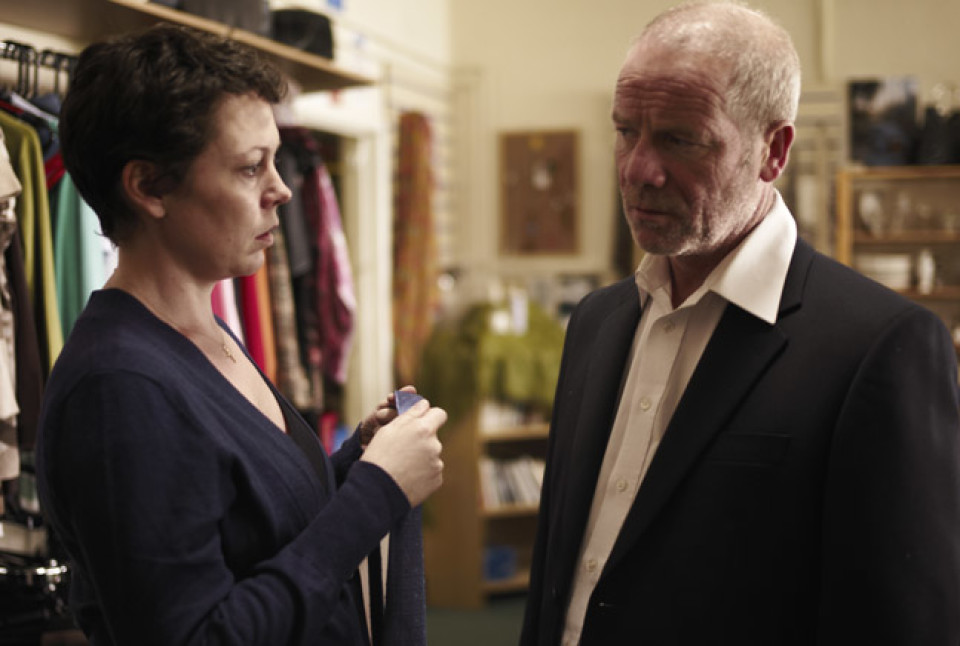
You move the camera very slightly forward on one occasion when it’s positioned in the back room of the charity shop observing Hannah in the front. She’s framed by the doorway, a little lost. Is that kind of sympathetic movement toward her instinctive?
Yeah. It’s good to stand back. You don’t need to go in there and cover it. That scene was all about the duality of her situation. On one hand, it’s about how she’s feeling about what she’s living with—her husband’s abuse—and anesthetizing it with drink, and on the other hand there’s her public face, where she dries her tears and says, “Good morning!”—that’s the Hannah for the world to see.
I was also struck by a pair of rhyming shots set on a hill against the skyline at night that capture Joseph’s change. First, we see him staggering home from the pub; later you repeat that shot, but he’s accompanied by Hannah.
Now he’s got a companion with him. We shot the wake scene, which was three hours of everyone singing and dancing. I just let the actors off the leash and I could have sat there all day watching them. I went up to Peter afterward and told him we’d got to do a three-page dialogue scene between Hannah and Joseph, where he started to ask her again about religion and she began to elaborate about some of the things that had happened to her. And I went, “I ain’t shooting that after what I’ve just seen.” During the edit, the editor said Peter and Olivia had dropped character during the wake, and I said, “Perfect. So they should.” They’re weightless in that scene. She suddenly finds herself in a community where’s she accepted and she’s flowing and laughing, and he’s lighter for being in her company. It’s all changing. At the end, we had one day to do pickup shots, and that’s when we filmed them on the hill, coming from the wake. It was something that was missing.
It’s like a happy echo of the earlier scene that wasn’t happy, when he was in a rut.
Just one shot like that can mean so much. It’s the nuance that lives with you.
Is there any connection between Tyrannosaur and the work you did as a photography student?
All the reference photos for Joseph’s house came from a project in which I shot the house I grew up in. I came home [from the University of Brighton] for a week and took photographs of my home. The project became about my mum and dad’s relationship, though their faces never appeared in it. I showed those photos to the art department and said, “This is what I want. I want these headless ornaments.” I lived in a house where if the ornaments broke they never got glued back. My old man would never glue an ornament.
Will you try to focus more on directing than acting in the future?
I think so. The idea really is to try to cut out the jobs. At least when I’m on the set and I’m invested as an actor, it’s a manageable experience, as opposed to when I’m there knowing I’m doing it because I’ve got to pay the mortgage. It’s my fault. I chose to live where we live, with three kids, and I’m not going back to where I grew up. Actually, I could go back, easily, but I’m not taking them back.
There is satisfaction in generating your own work. [With writing and directing] I’m in control of it, it’s my beast, and I can move it along how I want to. When you act in a film, you’re at the mercy of people all the time—their decisions, their ideas, their cuts—and as an actor it’s hard if you don’t trust the person directing.
Would you step out of the social environment you grew up in and write and direct other kinds of films?
God, yeah. I’m not making the same film over and over again. The third film I want to make is a book adaptation set in America. I’m not going to be writing films that people think are autobiographical. If I’m going to sustain a career, I’m going to explore the stories I want to explore, and they can be on any shore. I don’t want to become a parochial filmmaker.
What’s your next film as writer-director?
It’s called The Leaning and it’s a ghost story, one that’s a bit more literal than Tyrannosaur. It’s about a girl who can’t get rid of her ghost and every time she tries to be intimate, this phenomenon happens around her. I’ll probably never get to direct a Stephen King story because of all the red tape, so I wrote my own. I find it exciting.







